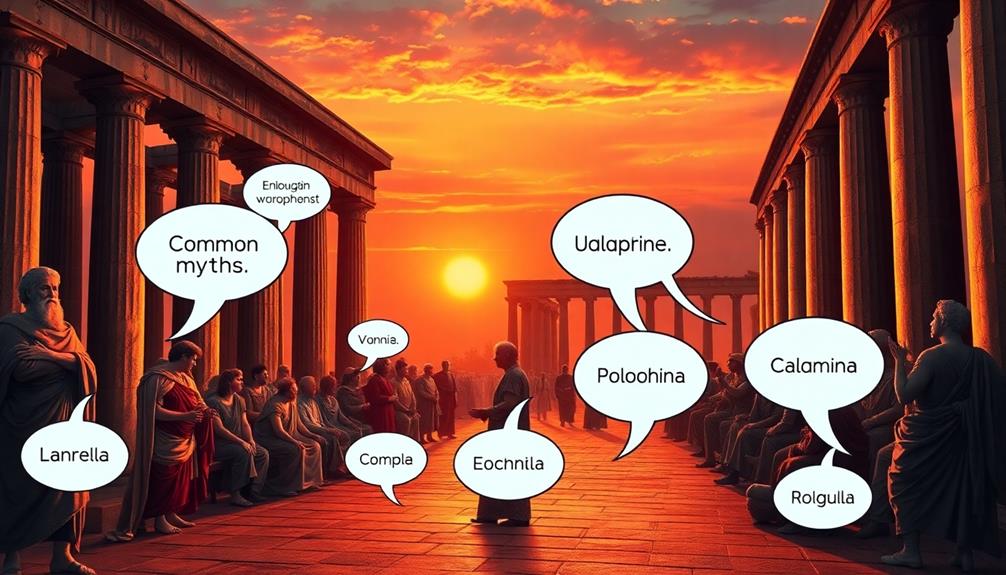Greek philosophers challenge many common myths you've probably believed. They weren't just rational thinkers; Heraclitus embraced chaos and change. Socrates never penned his ideas, relying on dialogue instead. Plato's cave isn't a literal place but a metaphor for ignorance. Contrary to the belief that Aristotle created the scientific method, he merely shaped its development. Many overlook women's contributions, while Pythagoras explored more than numbers. Plus, philosophers greatly influenced science. The Socratic method goes beyond asking questions; it's about revealing deeper truths. Unraveling these myths reveals a richer picture of their legacy and relevance in today's world.
Key Takeaways
- Many believe Aristotle invented the scientific method, but his influence on it became prominent only during the Renaissance, not in his own time.
- Socrates never wrote down his teachings; our understanding comes from Plato and Xenophon, leading to differing interpretations of his philosophy.
- Pythagoras is often seen solely as a mathematician, but he also founded a philosophical movement that intertwined ethics, religion, and mathematics.
- Contrary to common beliefs, female philosophers like Hypatia of Alexandria significantly contributed to philosophy, challenging the notion of exclusively male intellectual legacy.
- Democritus is usually viewed as a strict materialist, yet he also explored ethical dimensions, linking happiness to human experiences beyond mere physical matter.
Philosophers Were Always Rational Thinkers
It's a common belief that Greek philosophers were strictly rational thinkers, but that's a simplification. While ancient Greeks like Heraclitus recognized the presence of chaos and change in the universe, they didn't solely adhere to rationality. Heraclitus famously stated, "Change is the only constant," which shows that he valued the complexities of existence over a rigid rational framework.
This complexity can also be seen in contemporary art, where urban themes reflect the rapid modernization and socio-political issues, mirroring the philosophical inquiries of the past urban themes reflect.
On the contrary, Parmenides challenged the idea of change, arguing that the sensory world is illusory. This highlights how philosophical inquiries could lead to paradoxical conclusions, blurring the lines between rational thought and deeper truths.
Socrates, through his method of questioning, revealed the limitations of human knowledge, suggesting that rationality often coexists with ignorance.
Even thinkers like Democritus, who proposed atomism, engaged in speculation about the nature of matter and the void.
Plato's Theory of Forms further complicates the narrative, blending rational idealism with mystical elements, positing that our physical world is merely a flawed reflection of a higher reality.
Consequently, the philosophical landscape of ancient Greece was rich and varied, intertwining rationality with a profound acknowledgment of change.
Socrates Never Wrote Anything

Socrates, the iconic figure of Western philosophy, never put pen to paper, relying instead on oral tradition to share his ideas. As an ancient Greek philosopher, he believed that writing could create a false sense of knowledge. Instead, he used the Socratic Method, a technique centered on asking probing questions to stimulate critical thinking and deepen understanding. This method emphasized dialogue over documentation, which is why you won't find any writings directly authored by him.
In a way, his approach can be likened to the importance of creating a personal budget, where engaging with one's financial situation leads to deeper insights and better decision-making.
Most of what you know about Socrates comes from the dialogues of his student, Plato, and other contemporaries like Xenophon. These accounts, written in the 4th century BC, have shaped your perception of his philosophy and character. However, the absence of Socratic texts means that interpretations can vary widely, leading to contrasting portrayals.
While Socrates's oral teachings fostered rich discussions, they also present challenges in accurately understanding his ideas. His commitment to dialogue over written records has left a lasting impact on Western thought, encouraging you to engage in conversations that question and explore rather than simply accept information.
Plato's Cave Is a Reality
Many people unknowingly live in a metaphorical cave, much like the prisoners in Plato's Allegory of the Cave. This allegory, found in "The Republic," tells us that many are chained by ignorance, mistaking shadows for reality. The shadows represent sensory experiences and societal beliefs that mislead you, preventing a true understanding of the world.
Plato believed that these shadows have always existed, shaping how you perceive reality. The journey toward self-improvement aligns with this allegory, as it involves the continuous learning and adaptation necessary to break free from these chains and gain a clearer perspective on life, emphasizing the importance of unlocking the power of self-improvement.
To escape this cave, you must come to recognize the difference between appearances and the true essence of things, which he termed the Theory of Forms. This journey toward enlightenment isn't easy, as it involves questioning your beliefs and seeking deeper understanding.
When you step into the sunlight, you see the world as it truly is, moving beyond mere shadows.
Plato's ideas have influenced psychology, education, and metaphysics, emphasizing the importance of critical thinking. By challenging your assumptions and pursuing knowledge, you can break free from the cave.
Aristotle Invented the Scientific Method

While Plato's insights on reality challenged your perceptions, Aristotle's contributions paved the way for a more systematic approach to understanding the natural world. You might think Aristotle invented the scientific method, but that's a misconception. He laid the groundwork by emphasizing empirical observation and systematic classification, akin to the refrigeration cycle processes that demonstrate the importance of understanding fundamental principles in science.
However, the scientific method as we understand it evolved later. Aristotle focused on careful observation of natural phenomena and used deductive reasoning, but his methods were primarily qualitative rather than quantitative. He distinguished between types of knowledge, such as scientific knowledge (episteme) and practical knowledge (phronesis), which greatly influenced future scientific inquiry.
His works, including "Physics" and "Metaphysics," stress the importance of understanding causes and principles in nature. It's fascinating how Aristotle's influence on the scientific method became more pronounced during the Renaissance. Scholars revisited his texts, integrating his ideas into modern scientific practices.
Heraclitus Advocated for Stability

Heraclitus, far from advocating for stability, famously declared that "everything flows," underscoring his belief in the ever-changing nature of reality. He viewed fire as the fundamental element representing transformation, illustrating his conviction that stability is merely an illusion. In Heraclitus's worldview, all things exist in a perpetual state of flux, constantly evolving and adapting.
His paradoxical statement, "No man ever steps in the same river twice," emphasizes that both the river and the man are in constant change. You can't experience the same moment twice, highlighting the transient nature of existence. According to Heraclitus, this fluidity is essential to understanding life and the universe.
Furthermore, he argued that conflict and strife are necessary for harmony. In his eyes, oppositional forces drive the process of change, challenging the idea of a static balance. Instead of seeking stability, he encouraged embracing the dynamic nature of life, recognizing that change is a fundamental aspect of existence.
Democritus Was Just a Materialist

The notion that Democritus was merely a materialist oversimplifies his profound contributions to philosophy. While he's best known for proposing the concept of atomism, arguing that all matter is composed of indivisible particles called "atomos," his ideas extend far beyond basic materialism.
Democritus believed that the arrangement and movement of these atoms in the void determined the properties of all substances, showcasing a complex understanding of reality that resonates with the importance of heartfelt expressions of love in human experience, not just a focus on physical matter.
Moreover, Democritus recognized the significance of the mind and perception, suggesting that while atoms form the physical world, our experiences shape our understanding of it. This duality showcases his departure from a purely materialist view. His thoughts also paved the way for modern atomic theory, illustrating that his work engaged with metaphysical considerations.
Additionally, Democritus emphasized ethics and the pursuit of happiness, highlighting the importance of quality of life and human experience. By weaving together ideas of matter, perception, and ethics, Democritus reveals himself as a philosopher whose insights transcend simple materialism, enriching the landscape of ancient thought in ways that still resonate today.
Greek Philosophy Ignored Women

Greek philosophy often gets painted as a strictly male domain, leaving the contributions of women shrouded in obscurity. While it's true that many notable philosophers were men, figures like Hypatia of Alexandria and Diotima made significant contributions to philosophical thought. Unfortunately, their works were often lost or overshadowed by their male counterparts.
This exclusion mirrors dynamics in other areas, such as relationships, where emotional intelligence and maturity are often overlooked in favor of more traditional measures of worth. For instance, the classy way to explain a breakup highlights the importance of clear communication, which is a skill evident in many of these overlooked women.
Plato recognized women's intellectual capabilities in his "Republic," arguing they could hold the same roles as men in society. However, this progressive view wasn't widely adopted, and many followed Aristotle, who deemed women inferior in intellect and virtue. His opinions heavily influenced societal norms, further excluding women from formal philosophical circles.
This lack of recognition for women's roles in ancient philosophy reflects broader societal attitudes towards gender. It limited women's participation in intellectual discussions and allowed their contributions to fade into obscurity.
As a result, the legacy of Greek philosophy often overlooks the impactful ideas offered by women. By acknowledging these overlooked figures, you can help reshape the narrative and appreciate the richness of philosophical discourse that includes both genders.
Pythagoras Was Only About Numbers

Pythagorean brilliance often overshadows Pythagoras' broader philosophical contributions, leading many to mistakenly view him as solely a mathematician. While you might know him for the Pythagorean theorem, his influence stretches far beyond numbers.
Pythagoras founded a philosophical and religious movement that highlighted the importance of numbers in understanding the universe. He believed in metempsychosis, the idea that the soul is immortal and undergoes cycles of rebirth, indicating a profound engagement with ethical and existential questions. This aligns with the principles of personal development, which emphasize mental and emotional growth, mirroring Pythagorean ideals of self-improvement and understanding the deeper aspects of life through Law of Attraction principles.
His followers, known as Pythagoreans, adhered to strict lifestyle rules, including dietary restrictions and communal living, showcasing the ethical dimensions of his teachings.
Pythagoras also made significant connections between numbers and harmony, arguing that musical intervals could be expressed as numerical ratios. This insight bridged mathematics, philosophy, and the arts, illustrating that he viewed the world through a lens that unified various disciplines.
Ultimately, the Pythagorean belief that all things are reducible to numerical relationships influenced not just mathematics but also philosophy, music, and cosmology.
Philosophers Didn't Influence Science

Throughout history, many have dismissed the profound impact philosophers had on the development of science. However, this view couldn't be further from the truth. Greek philosophers like Aristotle didn't just ponder abstract ideas; they laid vital groundwork for scientific inquiry. By emphasizing empirical observation and categorizing knowledge, they influenced fields like biology, physics, and ethics, much like how predictive modeling enhances decision-making in education through data analysis and forecasting student performance predicting educational needs.
Take Democritus, for instance. His early concept of atomism suggested that matter consists of indivisible particles, prefiguring modern atomic theory. Similarly, Plato's Theory of Forms sparked mathematical thinking, guiding the pursuit of idealized forms that shaped geometry and rational thought.
Then there's Anaximander, who created one of the first maps and approached cosmology and geography with a systematic mindset. This method laid the foundation for future scientific methodologies.
These philosophers marked a significant shift from mythological interpretations of nature, opening the door to rational explanations. Their contributions set the stage for the scientific revolution that would emerge in later centuries.
Socratic Method Was Only About Questions

Many people mistakenly believe the Socratic Method is just about asking questions. In reality, it's a dynamic dialogue aimed at stimulating critical thinking and illuminating ideas through a cooperative exchange of perspectives.
Socrates didn't merely toss out questions; he engaged in conversations that often revealed contradictions in his interlocutors' beliefs. This dialectical approach promotes deeper understanding, encouraging you to reflect on your own beliefs and assumptions. By integrating techniques such as deep breathing exercises to enhance focus during these discussions, participants can cultivate a more attentive mindset.
By participating in this method, you foster self-examination and philosophical inquiry, endeavoring to uncover underlying truths rather than just accepting conventional wisdom. Socrates sought to guide others towards clearer understandings of concepts like virtue, justice, and the good life. His goal was to facilitate a more profound comprehension through rigorous questioning and dialogue.
Moreover, the Socratic Method emphasizes ethical considerations and moral character. Socrates believed that knowledge should lead to a more virtuous life, not just intellectual achievement.
Frequently Asked Questions
Which Greek Philosopher Went Crazy?
You might find it intriguing that some Greek philosophers, like Heraclitus, exhibited signs of madness due to their radical ideas. Others, like Socrates, faced societal backlash, leading to intellectual isolation that could resemble a form of madness.
Who Was the Most Controversial Greek Philosopher?
Did you know Socrates' trial in 399 BC had over 500 jurors? He's often considered the most controversial Greek philosopher due to his relentless questioning and challenges to societal norms, which ultimately led to his execution.
What Greek Myths About Artificial Intelligence?
You'll find that ancient Greek myths, like Pygmalion or Hephaestus' automatons, explore themes of creation and sentience, sparking questions about love, consciousness, and the potential for intelligent beings, much like today's discussions on artificial intelligence.
Who Was the Most Savage Greek Philosopher?
Like a fierce storm sweeping through a calm town, Diogenes of Sinope stands out as the most savage Greek philosopher. You'll find his antics, like urinating on insults, both shocking and thought-provoking, challenging societal norms.
Conclusion
So, next time you think you've got Greek philosophers all figured out—remember, they're not just dusty old thinkers lost in time. They're the wild card in the intellectual deck, reshaping our understanding of reality, science, and even gender. You might find that Socrates didn't just ask questions but sparked revolutions, while Pythagoras wasn't just crunching numbers but dancing through ideas. Ironically, these minds are anything but static; they're the vibrant threads weaving through the fabric of our knowledge today.









